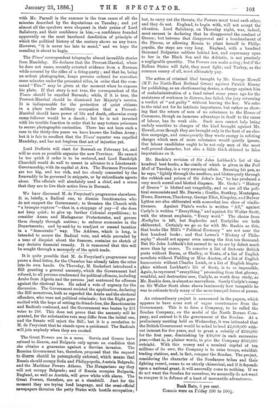Mr. Raskin's revision of Sir John Lubbock's list of the
hundred best books, a fac-simile of which is given in the Pall Mall of Tuesday, is a very amusing affair. Running his pen, as he says, " lightly through the needless, and blottesquely through the rubbish and poison of Sir John's list," he has produced a very •much scored and blotted diagram. Mr. Grote's " History of Greece " is blotted out vengefully, and so are all the poli- tical economists and Mr. Darwin ; Goethe, Southey, Montaigne, Hume, Emerson, Thackeray, George Eliot, Kingsley, and Bulwer Lytton are also obliterated with somewhat less show of vindic-
tiveness. Against Plato's works is written "All," against Carlyle is written " Everything," and against Sir Walter Scott, with the utmost emphasis, "Every word." The choice from Aschylas is left, but Sophocles and Euripides are both obliterated. Certainly we go so far with Mr. Ruskin as this, that books like Mill's " Political Economy " are not near the first hundred books ; and that Lewes's " History of Philo- sophy " should not appear even among the first ten thousand. But Sir John Lubbock's list seemed to us to err by defect much more than by excess. To conceive a list of first-rate British poets without Burns, or Shelley, or Keats, of a list of English novelists without Fielding or Miss Austen, of a list of English humourists without Charles Lamb, or a list of English biogra- phies without Lockhart's life of Scott, is to us impossible. Again, to represent " everything " proceeding from that gloomy, wrathful, and destructive seer, Carlyle, as worth deep study, as Mr. Raskin does, is almost as marvellous. Surely Carlyle's essay on Sir Walter Scott alone shows luminously how incapable he was to estimate truly many of the more tranquil forms of power.


































 Previous page
Previous page